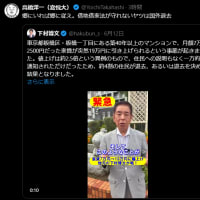“The Disease of Anti-Japan Sentiment” – A Former Yomiuri Journalist’s Perspective
August 9, 2018
The following is a chapter I originally published on June 27, 2018. It should be read again, both in Japan and around the world.
All emphasis within the text below is mine.
The Disease of “Anti-Japan” Sentiment
I worked as a journalist for the Yomiuri Shimbun for over 20 years, and throughout that time, I consistently harbored serious doubts about the Asahi Shimbun’s journalistic stance—specifically, its tendency to prioritize ideology over facts.
When I discovered that one of their articles concerning Article 9 of the Constitution had been fabricated, I was overcome with an emotion akin to rage. It was nothing less than a desecration of journalism.
At the same time, I began to wonder whether there was some sort of psychological illness underlying a newspaper company systematically fabricating news.
Why do they fabricate? Or more to the point—how is it even possible for them to fabricate?
As I pondered this, I recalled a remark once made by a German historian about "the study of history through psychology." That inspired me to consider whether the Asahi Shimbun and other progressive intellectuals in Japan’s left wing could be analyzed through a psychoanalytic lens.
This thought was the catalyst behind my book: The Disease of “Anti-Japan” – Undoing the Brainwashing of the Japanese People by GHQ and the Media (Gentosha Publishing).
Conservatives in Japan often criticize the Asahi Shimbun as being “masochistic.”
Indeed, for a media outlet that belongs to Japan to constantly engage in reporting that damages Japan’s national interests—it’s understandable that many perceive it that way.
However, paradoxically, I arrived at the conclusion that the Asahi Shimbun might, in fact, be the most narcissistic organization of all.
In other words, the paper is driven by a self-image of being the “good Japanese,” in contrast to the “bad Japanese” who fail to atone for Japan’s wartime past. This self-protective instinct and moralistic worldview are what I believe compel the Asahi Shimbun to fabricate stories.
When I read this hypothesis, I immediately thought of something—namely that it explains the psychological makeup of Tsujimoto Kiyomi, whom NHK insists on putting on air despite the fact that she was originally arrested for criminal activity. It all made perfect sense.
When I consulted a psychiatrist about this hypothesis, they responded, “Yes, the Asahi Shimbun exhibits many traits consistent with narcissistic personality disorder.”
That disorder could indeed be renamed as “the anti-Japan disease.”
Of course, everyone possesses some degree of narcissism. But when that narcissism becomes excessively inflated, it inevitably creates friction with others.
In the case of the Asahi Shimbun, their excessive self-love has caused conflict with Japanese society and the Japanese people.
The worst example of this is their reporting on the comfort women issue.
Instead of basing their articles on facts derived from thorough reporting, the Asahi Shimbun continued for years to publish stories based on the lies of Seiji Yoshida.
Since the foundation was false from the start, everything that followed was nothing but fiction.
Their reporting on the Nanjing Massacre and textbook issues were likely also born of this overgrown narcissism—but regardless of intent, it is a fact that Asahi Shimbun’s reporting has strained relations with neighboring countries and severely damaged Japan’s international reputation.















